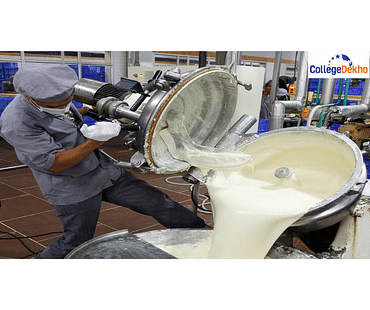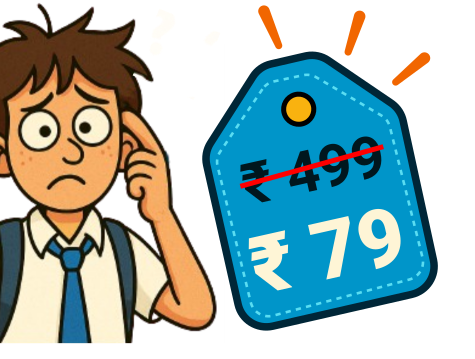The ITI Milk and Product Technician syllabus includes concepts like Milk Collection and Preservation, Hygiene and Sanitation, Basics of Dairy Technology, Milk Processing, Equipment and Machinery etc. The ITI Milk and Product Technician syllabus can be checked here.

ITI Milk and Product Technician Syllabus: The syllabus of ITI Milk and Product Technician is meticulously designed to provide candidates with comprehensive training, necessary skills and technical knowledge that is required for the Dairy industry. The ITI Milk and Product Technician Trade Syllabus covers various aspects of milk processing, dairy product manufacturing, quality control, and equipment maintenance, aiming to equip trainees with the expertise needed to work effectively in dairy plants and milk processing units. Candidates can check this article to know more about the ITI Milk and Product Technician trade syllabus.
Also Read:
ITI Milk and Product Technician Syllabus
The detailed syllabus of ITI Milk and Product Technician can be checked here.
Trade Theory:
- Basics of Dairy Technology
- Introduction to dairy technology
- Structure and composition of milk
- Physicochemical properties of milk
- Dairy Plant Management
- Layout and organisation of a dairy plant
- Inventory management and logistics in dairy production
- Cost estimation and budgeting in the dairy industry
- Milk Collection and Preservation
- Methods of milk collection
- Quality control in milk collection
- Cooling and preservation techniques
- Milk testing and analysis
- Milk Processing
- Pasteurisation, homogenization, and standardisation
- Separation and clarification
- Packaging and storage of milk
- Hygiene and Sanitation
- Importance of hygiene in the dairy industry
- Cleaning and sanitization of equipment and processing areas
- Safety regulations and personal hygiene
- Dairy Products
- The manufacturing process of different dairy products like butter, ghee, yoghourt, curd, cheese, ice cream, and flavoured milk
- Fermented dairy products
- Quality control and standards of dairy products
- Equipment and Machinery
- Knowledge of dairy equipment like homogenizers, pasteurizers, separators, and chillers
- Maintenance and troubleshooting of dairy machinery
- Packaging and Storage
- Types of packaging materials used in dairy products
- Storage conditions and shelf-life of dairy products
- Quality Control
- Testing and grading of milk and milk products
- Adulteration of milk and detection methods
- Standard practices and quality standards in the dairy industry
- Marketing and Distribution
- Supply chain and distribution channels for dairy products
- Sales and marketing strategies for dairy and milk products
- Consumer behaviour and Market Trends in the Dairy Industry
Trade Practical
- Introduction to Dairy Industry
- Overview of the dairy industry, milk collection, handling, and storage.
- Introduction to the milk supply chain, from the farm to processing units
- Quality Control in Dairy Products
- Sensory evaluation of dairy products for quality.
- Techniques to test the chemical and microbiological quality of finished products.
- Quality assurance measures to ensure product safety and standards
- Operation of Dairy Equipment
- Handling various dairy equipment like milk pasteurizers, homogenizers, churners, separators, and packaging machines.
- Troubleshooting and maintenance of dairy machinery
- Entrepreneurship and Marketing
- Basics of starting a dairy business or setting up a small-scale dairy unit.
- Marketing strategies for selling dairy products.
- Understanding of supply chain management in the dairy sector
- Milk Testing and Quality Control
- Sampling of milk and analysis for quality parameters.
- Tests for milk adulteration, acidity, fat content, and specific gravity.
- Familiarity with equipment used in milk testing.
- Production of Dairy Products
- Practical knowledge in manufacturing dairy products like butter, ghee, paneer, curd, cheese, and ice cream.
- Standardisation, packaging, and storage of dairy products.
- Use of cultures and enzymes in dairy product preparation.
- Packaging and Storage of Dairy Products
- Techniques for packaging liquid milk and other dairy products.
- Types of packaging materials used in the dairy industry.
- Storage conditions and shelf-life management of dairy products
- Sanitation and Hygiene Practices
- Importance of cleanliness in dairy processing.
- Cleaning and sanitising equipment and utensils used in the dairy industry.
- Safety precautions and measures to avoid contamination
- Milk Processing Techniques
- Techniques of milk pasteurisation, sterilisation, and homogenization.
- Different methods of milk processing: filtration, clarification, and separation.
- Handling and maintenance of milk processing machinery
- Waste Management in the Dairy Industry
- Managing and recycling dairy waste products.
- Environment-friendly disposal of waste and by-products from the dairy industry.
- Techniques to minimise waste and improve sustainability
Structure of ITI Milk and Product Technician Trade
The distribution of training hours across ITI Milk and Product Technician trade can be checked here in the below table.
Course Syllabus | National Training Hours |
|---|---|
Trade Practical | 1200 |
Trade Theory | 240 |
Employability Skills | 120 |
Total | 1600 |
Assessment for ITI Milk and Product Technician Trade
Candidates can check in detail about the ITI Milk and Product Technician trade assessment process from this section.
Assessment Process
The assessment process will be based on internal assessment and final assessment. The process involved is explained in detail below.
- Internal Assessment - It is a form of continuous assessment completely based on the Formative Assessment Method. Here, the training institute will maintain a detailed individual trainee portfolio
- Final Assessment - The final assessment will be in the form of a summative assessment. The final assessment will be conducted by the Controller of Examinations, DGT. Before marking the practical examination the individual trainee’s profile will also be assessed
Method of Assessment Criteria
The following evidence will be checked as methods of assessment for ITI Milk and Product Technician Trade.
- Job Carried out in Labs / Workshops
- Record Book / Daily Diary
- Answer Sheet of Assessment
- Viva-Voce
- Progress Chart
- Attendance and Punctuality
- Assignment
- Project Work
Marking Scheme
Candidates can follow the below table to learn about the marking scheme for internal assessment.
Grade | Particulars |
|---|---|
60% to 75% |
|
75% to 90% |
|
Above 90% |
|
The syllabus of ITI Milk and Product Technician Trade allows candidates to have a theoretical understanding of the trade as well as practical knowledge making them proficient in the dairy industry.
To get guidance for admission as a Milk and Product Technician, feel free to dial our toll-free number 1800-572-9877 or fill out CollegeDekho’s Common Application Form . An admissions counsellor will be assigned to you to make your journey hassle-free. In case of any queries or concerns, you can write to us in the QnA zone .
Are you feeling lost and unsure about what career path to take after completing 12th standard?
Say goodbye to confusion and hello to a bright future!

FAQs
Yes, there are plenty of job opportunities like Dairy Technician, Quality Control Technician, Production Supervisor, Lab Technician, Dairy Farm Supervisor, Milk Cooperative Societies, and Sales and Marketing Executive to name a few.
The total time duration of the ITI Milk and Product Technician trade is 1 year.
The key subjects included in the ITI Milk and Product Technician Trade are Dairy Technology, Food Science and Technology, Food Microbiology, Chemistry of Milk and Dairy Products, Packaging and Storage Techniques, Hygiene and Sanitation Practices, Equipment and Machinery Operation, Quality Assurance and Control and Dairy Plant Management.
Yes, there are plenty of job opportunities in sectors like the dairy industry, food and beverage industry, Government departments and agencies like food safety and standards organisations, agricultural and food research institutions, Quality control departments in dairy and food production units to name a few.
Was this article helpful?




















Similar Articles
Meghalaya ITI Admission 2025: Application Form (Out), Last Date (July 31), Eligibility, Trades Offered, Merit List, Counselling Process
Haryana ITI Admission 2025: Registration (Closed), Merit List (OUT), Seat Allotment, Counselling
Maharashtra ITI Admission 2025: Merit List (OUT), Seat Allotment (OUT), Counselling (July 8)
List of Jobs Available After ITI Wireman Trade
J&K ITI Admission 2025: Registrations (Closed), Merit List (OUT), Seat Allotment, Counselling
ITI Wireman Syllabus: Year-wise and Semester-wise Syllabus